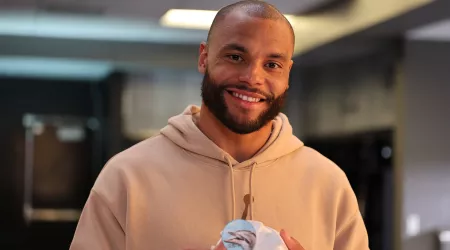Jodi: A sense of relief after colorectal cancer screening
For 25 years, Jodi lived an incredible life, enjoying all the basics and then some. Married to a successful doctor, she had never worried about healthcare. But about a decade ago, Jodi and her husband split, and she was left with almost nothing — including no health insurance.
“I was going from the lifestyle of the rich and famous to cleaning houses, scrubbing toilets, and going to the food bank to feed my son, who has autism,” Jodi said.
With no health insurance, Judi did her best to stay well through a patchwork of social services. She received medical care at clinics and urgent care offices, and she sought out free mammograms during Breast Cancer Awareness Month.
“It sounds so irresponsible, but I did everything that I was supposed to do, but I fell through the cracks,” Jodi said. “My biggest fear was if I got sick, not only do I have no health insurance, I have no one to take care of my son.”
During one clinic visit, the staff asked Jodi, 61, if she had been screened for colorectal cancer recently. It’d been over a decade, so they handed Jodi a FIT test — a test that identifies the presence of blood in stool, a symptom that can indicate colorectal cancer and other gastrointestinal issues.
“Within an hour of leaving the clinic, the head resident said they had found blood in my stool and were concerned,” Jodi said. “They wanted me to go for a colonoscopy.”
The only problem: The clinic had no gastrointestinal doctors on staff, and they didn’t know how to connect Jodi with a low- or no-cost colonoscopy option.
As many people do when confronted with a question, Jodi turned to the Internet. She found the Colorectal Cancer Alliance.
Marielle, a certified patient navigator with the Alliance, assured Jodi over our Helpline that false positives do occur with FIT testing, that a colonoscopy would provide definitive answers, and we could help her respond to any outcome.
Jodi was worried because she had been feeling ill at the time of the FIT test, probably because of stress, she said. But she was even more worried about who would take care of her son if something happened to her.
“I cannot tell you how compassionate and helpful they were,” Jodi said.
In the end, Jodi’s colonoscopy found polyps — tissue growths that are sometimes precancerous — but a biopsy showed hers were benign (not dangerous).
“When I got the results, I literally cried. I cannot tell you the sense of relief,” she said. “It doesn’t matter how many hours you work, it’s a terrible thing to not be able to take care of your health, it really is. I felt such a sense of relief not just for me, but for my son.”
Jodi’s struggle to take control of her health is not uncommon. A third of eligible adults are not getting screened for colorectal cancer, many due to lack of insurance.
Take our colorectal cancer screening quiz to find out which screening method may be right for you and get connected to resources.
Top resources

FDA approves ColoSense, mt-sRNA screening test from Geneoscopy
ColoSense is a screening test for adults, 45 years of age or older, who are at average risk for developing colorectal cancer (CRC).

Legislation introduced to address young-onset CRC
Explore the urgent need for the Colorectal Cancer Early Detection Act (HR 7714), legislation aimed at combating the rising incidence of colorectal cancer among younger adults through enhanced screening, education, and research.

Dak Prescott joins Alliance to ‘LEAD FROM BEHIND’
Initiative aims to reduce stigma and educate about screening choices, as the Colorectal Cancer Alliance launches a health equity fund to decrease disparities.





